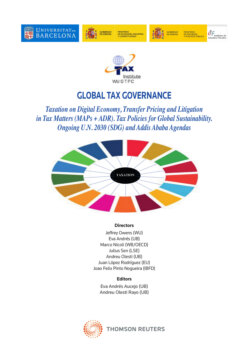Читать книгу Global Tax Governance. Taxation on Digital Economy, Transfer Pricing and Litigation in Tax Matters (MAPs + ADR) Policies for Global Sustainability. Ongoing U.N. 2030 (SDG) and Addis Ababa Agendas - Jeffrey Owens - Страница 24
На сайте Литреса книга снята с продажи.
EXECUTIVE SUMMARY
ОглавлениеDigitization. Accelerated by the Covid19 pandemic, the impact is being felt across all sectors - as the economy, government and civil society rapidly adapt to an online world. The world of tax is perhaps especially sensitive as tax administrations worldwide are confronted with not one but two simultaneous challenges:
• To create policies to address new digital business models and financial instruments in a global context,
• To adapt administrative processes and procedures to take advantage of promising digital technologies.
It is the second of these that is the focus of this chapter – how can digital technologies play a role in tax compliance, and specifically in reducing noncompliance and fraud? Digital automation projects continue to demonstrate impressive revenue increases and reduced administrative costs. However, there is a dark side as well as automation has also been a means of introducing risk by enabling tax fraud to be executed more rapidly and broadly than previously possible.
Navigating this complex and rapidly evolving landscape requires tax administrators to become grounded in the both the pitfalls and promise of digital technologies. Given the pervasive nature of technology in our lives and the economy, its only appropriate that now the full complement of decisions; strategic, policy and administrative, must now be informed by the range of options digital tech provides.
Digital is not a one size fits all. As jurisdictions vary in their circumstances and needs, so digital capabilities must be selected and combined into uniquely relevant compositions. We hope this work helps provide the insight needed to begin or continue the situationally specific conversations around what might be an appropriate composition of digital technologies for your specific situation.
The remainder of this chapter is organized into four parts;
• First to provide context we briefly cover four issues: the tax gap, challenges from the digital economy, the digitization of fraud, and the pace of technology.
• Next, we highlight the current predominant path of response, that of centralized data collection.
• We then dive into exploration of two key technologies, machine learning and blockchain, and how they can be leveraged to effect in risk management and fraud detection.
• Finally, we highlight options and developments that we believe will be increasingly impactful and potentially synergistic as we move forward: digital cooperative compliance and central bank digital currencies.
The tone of this chapter is not indifferent as it is our belief that designs that are supportive of cooperation between tax administrators and honest taxpayers against the common enemy of tax fraudsters will be the future of taxation. The overarching theme is anchored in the premise that through digital technology tax can move beyond voluntary compliance into a new form of cooperative compliance, where taxpayers and tax administrators alike contribute for not just their own but the mutual benefit of all stakeholders. Within this construct proper incentives must be provided to motivate honest taxpayers while flagging and excluding fraudsters.
Finally, we would be remis if we did not touch upon the related issues of privacy and the emergence of central bank digital currencies. A battle beyond the realm of tax is clearly shaping up around the definition of money itself. We briefly discuss how the result of this battle may significantly alter the map of possibilities within tax.
